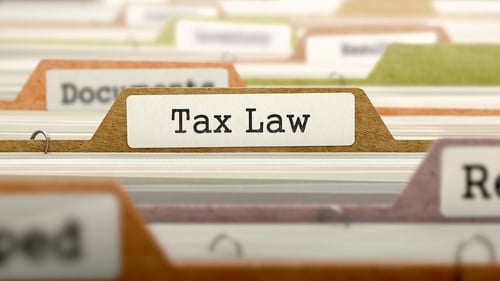Powell Tax Law Blog

Tax Tips for Recent Graduates
For the nearly 3 million young adults who graduate in 2023 with a bachelor’s or associate degree this year, there is plenty of good news as they head into the workforce.
“The labor market is strong, unemployment is low and, according to a survey by the National Association of Colleges and Employers, businesses are expecting to hire almost 4 percent more graduates from the class of 2023 than they did from the previous class,” reported The New York Times in July.
Along with the joy of the first paycheck … and second … and third … comes the reality of having to pay your share of taxes.
“If you’ve graduated from college, congratulations on the accomplishment. This is a time your financial responsibilities will likely increase, including complying with your tax obligations to the IRS,” says LendEDU. “While suddenly having to cope with tax obligations isn’t fun, the good news is, it’s common for your employer to just withhold the money you need to pay from your paychecks — as long as you complete your pre-employment forms correctly.”
What many graduates may not have realized is that their parents received a tax break until now by claiming them as dependents on their tax returns.
“Chances are good you were claimed as a dependent on your parents’ taxes while you were a college student. If you’re now on your own, you likely won’t get this tax benefit anymore,” says LendEDU. “When you’re a dependent, your parents claim you on their tax return. Your parents are eligible for certain tax credits and deductions because of your status as a dependent if you meet specific requirements.”
Self-Supporting or Dependent: The First Big Question
Of course, not every recent grad gets a job right away and many will return home and live with their parents as they transition to the next phase of their life.
The first question you will need to answer regarding taxes is whether you are self-supporting or dependent as this will affect how both you and your parents file their taxes next year.
There are two tests that could classify you as dependent on your parents' tax return: the qualifying child test and the qualifying relative test.
“Depending on your age, though, you may fall into either a qualifying child category or a qualifying relative category,” says Experian.
Overview of IRS rules for claiming a dependent
Tests to be a qualifying child:
- The child must be your son, daughter, stepchild, foster child, brother, sister, half-brother, half-sister, stepbrother, stepsister, or a descendant of any of them. An adopted child is always treated as your own child. The term “adopted child” includes a child who was lawfully placed with you for legal adoption.
- The child must be:
o Under age 19 at the end of the year and younger than you (or your spouse, if filing jointly).
o Under age 23 at the end of the year, a full-time student, and younger than you (or your spouse, if filing jointly).
o Any age if permanently and totally disabled.
- The child must not have provided more than half of his or her own support for the year.
- The child isn’t filing a joint return for the year (unless that joint return is filed only to claim a refund of income tax withheld or estimated tax paid).
- If the child meets the rules to be a qualifying child of more than one person, you must be the person entitled to claim the child as a qualifying child.
Tests to be a qualifying relative:
- The person can’t be your qualifying child or the qualifying child of any other taxpayer. A child isn’t the qualifying child of any other taxpayer if the child’s parent (or any other person for whom the child is defined as a qualifying child) isn’t required to file an income tax return or files an income tax return only to get a refund of income tax withheld.
- The person either:
o Must be related to you in one of the ways listed under Relatives who don’t have to live with you or
o Must live with you all year as a member of your household (and your relationship must not violate local law).
- The person’s gross income for the year must be less than $4,300. Gross income means all income the person received in the form of money, goods, property, and services, that isn’t exempt from tax. Don’t include Social Security benefits unless the person is married filing a separate return and lived with their spouse at any time during the tax year or if half the Social Security benefits plus their other gross income and tax-exempt interest is more than $25,000 ($32,000 if married filing jointly).
- You must provide more than half of the person’s total support for the year.
Tax Tip from Accolade Financial: If your parents meet the eligibility criteria to claim you as financially dependent for tax purposes, it is usually more beneficial for them to do so rather than you claiming a deduction for yourself. Parents typically have a higher income since they are older and more established in their careers. Because of this, your parents are likely to receive a greater tax benefit from your dependency status than you would by filing independently.
Tax Tips for Those New to the Workforce
W-4 forms, flexible spending accounts (FSA), 401(k)s and more – it’s a whole new financial world for those new to the workforce.
Here are some tax tips to consider:
- Get Tax Withholding Right: Recent graduates need to understand that the federal income tax is a pay-as-you-go tax which is why your first paycheck is going to be smaller than expected. Taxpayers can avoid unpleasant surprises come tax time by making sure that they get their tax withholding right. Pay close attention to the Form W-4 your employer made you complete upon hiring. Employees must specify a filing status on Form W–4 and may complete other parts of the form if they expect to have additional income, deductions beyond the standard deduction, or tax credits.
The IRS recommends that employees check their withholding, especially for anyone whose refund is larger or smaller than expected. For those who owe, increasing tax withholding in the current year is the best way to avoid having to pay tax when filing a tax return the following year. In addition, taxpayers should always check their withholding when a major life event occurs or when their income changes.
Tax Tip: When to Check Withholding:
o At the beginning of the year ensure the withholding is correct for the tax year ahead.
o When changes in tax law affect a taxpayer's situation.
o When the taxpayer has a lifestyle or financial change like marriage, divorce, birth or adoption of a child, home purchase, retirement, or filed Chapter 11 bankruptcy.
o When there is a change in a taxpayer's wage income, such as the taxpayer or their spouse starts or stops working or starts or stops a second job.
o If the taxpayer has taxable income not subject to withholding, such as interest, dividends, capital gains, self-employment and gig economy income, and IRA distributions.
o When a taxpayer reviews their planned deductions or eligible tax credits, including items like medical expenses, taxes, interest expense, gifts to charity, dependent care expenses, education credit, Child Tax Credit, or Earned Income Tax Credit.
- Take Advantage of 401(k)s, Traditional or Roth: 401(k)s are a great way to save for retirement and get a tax break. In many cases, your employer will also contribute matching funds to your account. The Hudson Community Foundation says less than one-third of employees aged 25 or younger participate in their employer’s 401(k) plan. The money you put into a traditional 401(k) plan is contributed tax-free, so you will not pay taxes on it until you withdraw it in retirement. An alternative is the Roth 401(k) plan where you contribute after-tax money so that when you retire, you will not pay taxes on it. Contributing to either style of 401(k) is easy as the money is taken directly from your paycheck.
- Flexible Spending Accounts: The IRS has other ways for new workforce hires to save including flexible spending accounts (FSA). An FSA is an employer-sponsored benefit that allows employees to set aside pre-tax money from their paychecks to pay for qualified medical expenses. FSAs are like savings accounts, but the money is used for health-related costs. FSA can be used to pay for things like deductibles, co-pays, and doctor visits.
- Health Savings Accounts: An alternative to FSAs is a health savings account (HSA) – these are tax-advantaged savings accounts that allow you to put money away and withdraw it tax-free for qualified medical expenses. HSAs are available to taxpayers who are enrolled in a high-deductible health plan. While employers can offer both FSAs and HSAs to their employees, the employees must choose to have either an FSA or HAS, as they can not have both at the same time (with two exceptions when an employee can have an HSA and a limited purpose FSA for dental, vision or preventative care or an HSA and a dependent care FSA).
- Student Loan Interest Deductions: Nobody likes paying their student loans, but new graduates should be reminded that they may qualify for a student loan interest deduction for 203. Smart Asset says “The student loan interest tax deduction is for students and their parents who are repaying federal student financial aid. It’s the “above the line” adjustment to your adjusted gross income (AGI) if you have paid interest to a qualified loan program during 2023. It can be taken whether you itemize deductions or take the standard deduction.” The largest amount you can claim for a student loan interest deductible is $2,500 for 2023, but that is limited by your income eligibility. Student loan interest phase-out starts at $75,000 modified AGI and ends at $90,000 for single, head of household, or a qualifying widow(er). For those married filing jointly, the phase-out begins at $150,000 and ends at $180,000.
Tax Tip: The student loans that qualify for the interest waiver during the pandemic are any loans owned by the Department of Education. These are Direct Loans, subsidized and unsubsidized Stafford Loans, Parent and Graduate Plus Loans, and consolidation loans. The student loans that do not qualify for the interest waiver are many. They are the Federal Family Education Loans (FFEL) and the Perkins Loans if held commercially by lending institutions. If they are held by the Department of Education, they are also covered. The only student loans that qualify for the student loan interest deduction are those that are for the benefit of you, your spouse, or your dependent and spent on qualifying education expenses. Private loans or loans from an employee-sponsored plan are not eligible. The loan must be for an academic term and the student must be at least half-time to qualify.
- Additional Tax Withholding for Gig Work: It’s not unusual for college students to pick up extra work in the gig economy. During your college years, this extra income may have not been enough to trigger taxes as dependents have to make more than $12,950 earned income per year or $1,150 in unearned income (investment, capital gains, other types of passive income). If you are going to be earning a paycheck for the second half of your graduation year, then earlier income from part-time, temporary, or gig work could add to your tax burden. Usually, no taxes are withheld for this type of work so you might consider having additional tax withheld with your full-time employer to cover any tax liability stemming from this other work.







